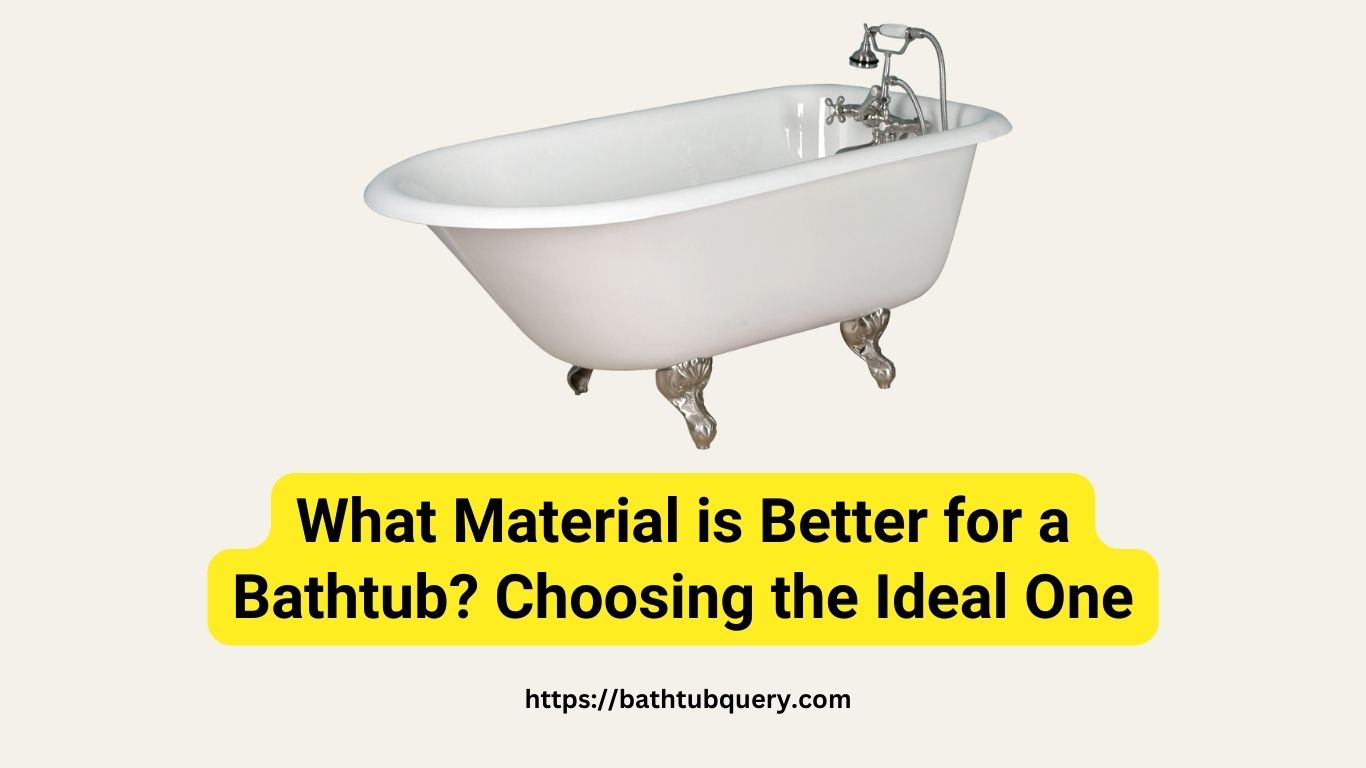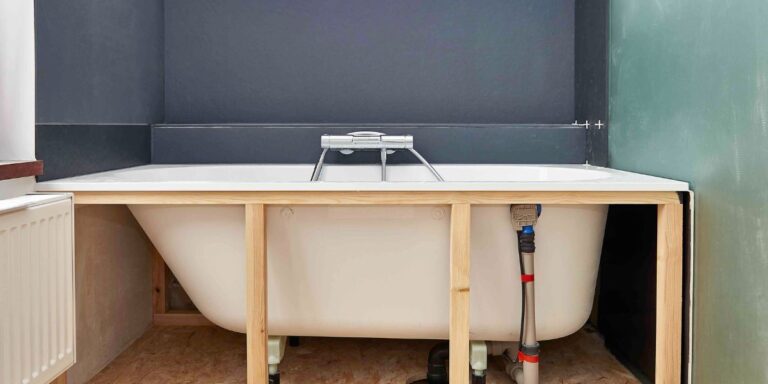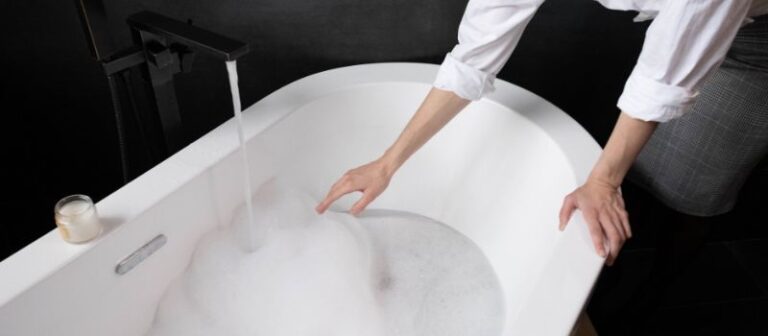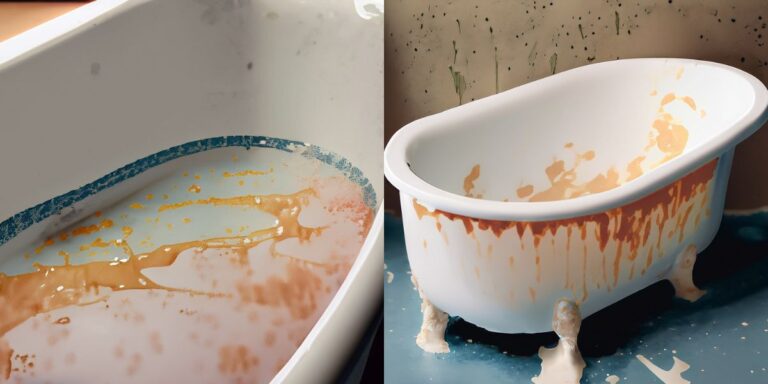What Material is Better for a Bathtub? Choosing the Ideal Bathtub Material
It is normal to be stumped when trying to decide on a bathtub material. There are a lot of factors to consider when deciding which material is ideal for a bathtub. Some people need a bathtub that can sustain heavy use for many years, and for them, durability is a top priority.
For some, the most important factor is how the tub looks; they want it to coordinate with the rest of the decor in the bathroom. Nonetheless, ease of use, low upkeep, and reasonable price may be deal breakers for some. This article will help you choose the best material for your new bathtub by exploring the many options and outlining the benefits and drawbacks of each.
What Material is Better for a Bathtub?
While cast iron tubs offer the utmost in durability and longevity, they can be heavy and difficult to install, particularly in upper-floor bathrooms. If this is a concern, your next best choice would be an enameled steel tub. It offers a fine balance between durability and ease of installation, while still providing a premium look and feel. Here are the most common materials used for bathtubs:
- Acrylic
- Porcelain-Enameled Steel
- Fiberglass
- Cast Iron
- Stone Resin
- Copper
Let’s delve into the specifics of each material.
Acrylic
Acrylic is the undisputed king of bathtub materials. Because of how light it is, you will not be putting any unnecessary pressure on your floor. This featherweight marvel also has an uncanny ability to hold heat, guaranteeing that your soak will be long, unhurried, and delightfully heated.
Those of you who enjoy using your imagination will be pleased to know that there is no shortage of bathroom layouts from which to choose. Keep in mind that despite appearances, this celebrity is vulnerable. Over time, acrylic may get scratched or discolored, and other materials may prove more durable.
Pros:
Lightweight, wide variety of designs, retains heat well
Cons:
May scratch or discolor over time, less durable than other materials
Porcelain-Enameled Steel
Then, we have steel that has been coated in porcelain. It is the go-to option for many since it is the sweet spot between durability and cost. The porcelain enamel coating that elegantly envelops the steel tub base is the perfect combination of durability and sophistication.
Despite its sturdiness, it might not do a good job of retaining heat in the bath. Also, keep in mind that a hard knock can cause an unattractive chip, despite the fact that it is durable.
Pros:
Durable, easy to clean, budget-friendly
Cons:
Doesn’t retain heat well, can chip if impacted
Fiberglass
The low cost of fiberglass baths is an added bonus. These tubs are constructed from multiple layers of fiberglass and coated with a smooth Gelcoat resin, making them easy on the wallet and the environment. What if a fracture appears, bringing destruction with it? Have no fear! Repairs can be made to fiberglass. However, wait on a second; there is a catch; its lifespan is shorter, and durability can be an issue over time.
Pros:
Affordable, lightweight, can be repaired if cracked
Cons:
Short lifespan, not very durable
Cast Iron
Cast iron is perhaps the best material for a bathtub. It is made of molten iron that was cast into a lovely shape and enameled, making it practically indestructible. If you like to soak for a while, you will love how well it retains heat. A cast iron tub has an unmistakable elegance that will never go out of style. Be wary, though; it is heavy, it can be pricey, and your design options may be restricted.
Pros:
Extremely durable, retains heat well, timeless look
Cons:
Very heavy, expensive, fewer design options
Stone Resin
Stone resin bathtubs may be the best option for you if you want the elegance and sophistication of real stone but can not justify the high cost. A sturdy, long-lasting surface that looks like real stone is the result of the right proportions of crushed stone and resin.
It is aesthetically pleasing, and it does a great job of maintaining a comfortable temperature in your bath. Remember that stone resin tubs are bulky, may be on the pricier side, and may require expert installation.
Pros:
Looks like natural stone, retains heat well, durable
Cons:
Heavy, can be pricey, may require professional installation
Copper
The king of one-of-a-kind design is here, and it is copper bathtubs. Its extreme longevity and ability to keep water at a comfortable temperature make for a genuinely delightful soak. The patina that the material acquires over time is part of its charm. You will need to delve deeper into your pockets, though, because these tubs cost more. Copper needs regular upkeep to preserve its luster.
Pro:
Extremely durable, retains heat well, adds a unique aesthetic
Cons:
Expensive, requires regular upkeep, may patina over time
Key Takeaways
It is important to consider your preferences, financial constraints, and aesthetic when selecting a bathtub material. Materials like acrylic and fiberglass are inexpensive and easy to work with, but they will not last as long as heavier metals like cast iron or copper. A middle ground between natural stone and porcelain enameled steel, stone resin offers the look of natural stone at a fraction of the expense.
FAQs
What is the most durable bathtub material?
Cast iron is considered the most durable bathtub material, but it’s also the heaviest and can be more expensive.
What bathtub material is easiest to clean?
Porcelain-enameled steel is generally considered the easiest to clean, due to its smooth, non-porous surface.
Does bathtub material affect heat retention?
Yes, materials like acrylic, cast iron, stone resin, and copper are known for good heat retention.
Are there eco-friendly bathtub materials?
Yes, natural materials like stone or copper are often considered more eco-friendly than synthetics.
What bathtub material offers the best balance of cost and durability?
Porcelain-enameled steel offers a good balance between cost and durability, offering a long-lasting tub at a reasonable price.
Read more about Is It Hard To Replace A Bathtub?

Amanda has been designing and installing bathtubs for over 15 years. She first got interested in the bathtub industry while working as an interior designer right after college. During her years as a designer, Amanda was frustrated by the lack of high-quality, unique bathtub options for her clients. This passion led her to start her own bathtub website in 2009.







